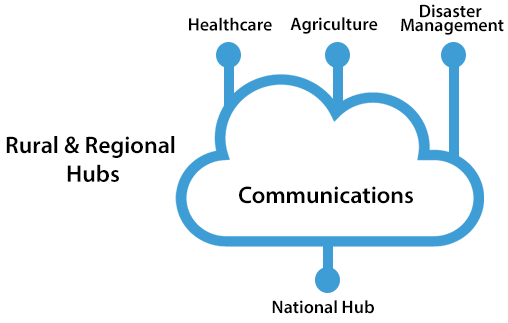The Samoa Pathway document highlights the importance of Capacity Building in Section 109 and clearly specifies the role of ICT in Para h (Section 109): “To establish national and regional information and communications technology (ICT) platforms and information dissemination hubs in small island developing States to facilitate information exchange and cooperation, building on existing information and communication platforms, as appropriate;”.
The objective of ICT4SIDS Partnership is to use these ICT hubs to accelerate the UN Post 2015 Agenda through ICT. In particular, we want to use these hubs to rapidly provide the following SDG (Sustainable Development Goals) related services to SIDS at rural, regional and national levels:
- Telemedicine for remote populations
- e-Agriculture for farmers in remote areas
- Fishery Distribution for the islands
- Tourism services for economic growth
- Distance Learning Centers for adult education
- Disaster Management Services for affected areas
- Business Intelligence (BI) for decision makers
ICT hubs may be physical (e.g., rented rooms in a school), virtual (e.g., a portal located somewhere in the “Cloud”), or a combination (e.g., a Center of Excellence powered by a portal). The ICT hubs in remote areas can be located closer to the Internet Backbone and thus serve nearby populations that have no connectivity.
Figure 1 shows a conceptual view where several rural and regional hubs that support health and human services are interconnected to a larger National hub that consolidates and disseminates vital information to other users. Our objective is to use a powerful computer aided advisory service to rapidly deploy collaborating networks of hubs like this for SIDS.

Figure 1: Conceptual View of ICT Hubs
Examples of ICT hubs are eSeva Centers in India that allow rural populations to pay bills and buy bus tickets, Telemedicine and Telenursing centers in Africa, and Community Centers for adult education by Faith-based organizations. In addition, several “Tech Hubs” and “Digital Hubs” are emerging in developing countries to educate the digitally knowledgeable work force of tomorrow.